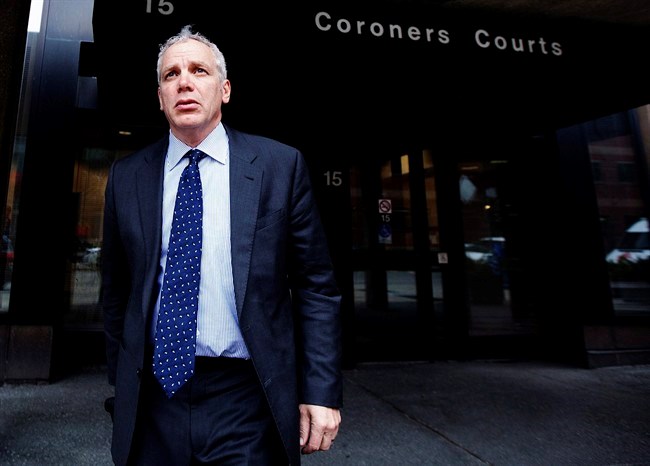TORONTO - The inquest into the death of a teenager who choked to death while prison guards videotaped the tragedy but did not intervene will serve as a memorial to her, the presiding coroner said Monday.
As the long-awaited probe finally opened, Dr. John Carlisle told jurors the death of Ashley Smith was a tragedy that needs to inform the future.
"We cannot now reverse the course of history. What is done is done," Carlisle told the five-women jury.
"This is the best memorial we can give to Ashley."
Smith, 19, of Moncton, N.B., died in October 2007 in her segregation cell at the Grand Valley Institution in Kitchener, Ont., which jurors will tour on Thursday.
In an agreed statement of facts, court heard the teen died after tying ligatures around her neck while guards — ordered not to enter her cell if she was breathing — watched and videotaped.
"Those immediate circumstances of Ashley Smith's death are shocking," said Jocelyn Speyer, coroner's counsel.
Jurors will view the "most disturbing" video of her death because "it provides an accurate account of what happened," Speyer told them.
The official cause of death was ligature strangulation and positional asphyxia.
About 8,000 pages of information will be presented to jury, and it will take "stamina and perseverance" to tell and listen to Smith's story, Speyer said.
The opening day of evidence marked the start of the second inquest. The first attempt went off the rails amid acrimonious legal squabbling, and was scrapped after the first coroner retired.
Julian Falconer, lawyer for the Smith family, said outside the court the hope is that the inquest will shed light on why a mentally ill young woman was subjected to what he called "absolute torturous" circumstances.
"This has been a very long time coming for a family that has literally fought blood, sweat and tears to get a process in which the truth would come out," Falconer said.
"We'd like answers to those questions, but invariably my experience has been (that) this ends up being turned on the family, so this is going to be a tough process."
In all, about 100 witnesses are expected to testify at the webcast inquest, which could last as long as a year.
Jurors heard how Smith had spent much of her last year in segregation, shunted across the country from prison to prison even as her mental health deteriorated.
Carlisle has made it clear he wants to explore how the prison system deals with the mentally ill.
Adopted at five days old, all seemed normal with Smith until she began acting out when she turned 10, the start of a long downward spiral that saw her suspended from schools and end up in youth custody at age 15.
In her three years in youth custody in New Brunswick, Smith racked up several hundred recorded incidents, ranging from refusal to hand over a hair brush, to self-harm and suicide attempts.
Her string of in-custody offences over the years — such as for spitting at guards or assaulting other inmates — each added new criminal convictions and more time behind bars.
By the time she died, a 45-day sentence had grown to a staggering total of 2,239 days — more than six years.
Monday's only witness, a program manager from Correctional Service Canada, said she didn't know if there were any oversight mechanisms to flag the ballooning sentence.
Kept almost entirely in segregation — something Smith demanded at times — the increasingly troubled teen spent the last year of her life shunted 17 times among nine institutions in five provinces.
She tried to hurt herself with alarming frequency.
In September 2006, weeks before she was moved into the adult prison system, Smith wrote in her journal: "If I die then I will never have to worry about upsetting my mom again."
Jurors were given Monday afternoon to read a 2008 report written by the New Brunswick child advocate — a sad account of Smith's time in youth custody.
Speyer told court Smith's prolonged segregation "may have a bearing on the circumstances of her death."
In Ottawa Monday, about 30 protesters observed 13 minutes of silence outside the Correctional Services Canada offices — the time it took for prison guards to respond after they found Smith choked to death in her cell.
Protesters blasted what they said was the government's penchant for secrecy.
"The public needs to know what goes on behind the walls of our institutions," said Jennifer Kilty, assistant professor of criminology at the University of Ottawa.
Demonstrators also voiced concerns about the prison policies of the Conservative government of Prime Minister Stephen Harper.
"Mass incarceration, mandatory minimum sentences, extended situations of punishment — they don't rehabilitate, they don't make us safer," Kilty said.
The inquest resumes Tuesday.



